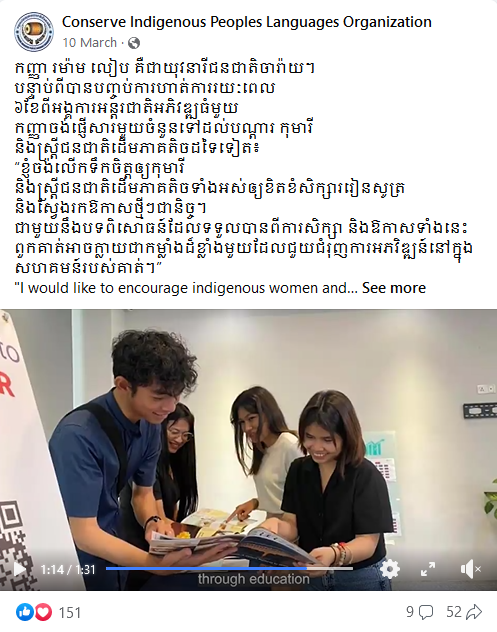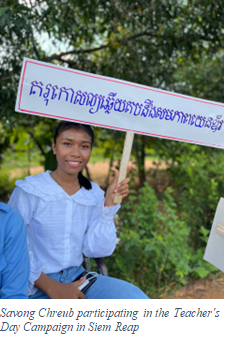Sinath is a leader of a commune-based organization (CBO) in her community. She started volunteering with Banteay Srei in 2008. Sinath wasn’t always very confident and active in her community. Living in a small community, Sinath faced pressures related to societal and family norms, stereotypes, and judgements. She took on traditional roles of taking care of her children, husband, and in-laws and didn’t feel brave enough to socialize outside the house and attend village activities or meetings.
After becoming a volunteer with BS, Sinath had more opportunities to attend different events with BS. Those events – meetings, trainings, public forums, study tours – in her province and beyond have helped her to build knowledge and experience. Now, Sinath has a better understanding of leadership and her self-worth. She has also gained new skills such as public speaking, communications, planning, business, community mobilization, and facilitation.

Sinath continues to equip herself with new knowledge and skills. In 2023, she learned and gained new knowledge from BS on sexual harassment. Sinath is a member of one of the five CBOs selected by BS to receive sexual harassment training. Sinath finds this new knowledge very important for her and other women in her community. After the training, she is able to recognize different types of harassment as well as harmful and discriminatory jokes often made by people around her.
Sinath believes that lessons on sexual harassment can help men to understand and cease their discriminatory behavior that leads to sexual harassment. After the training, she has applied what she learned in her daily life and among her monthly saving group that she belongs to. Her peers showed a lot of interest in the subject and expressed that this would help them shift their perception and inspire some positive changes in their daily lives.
For the future, Sinath plans to advocate on the issue of sexual harassment in her village by using operational funds received from Village Savings/Credit Group program. Along with the advocacy effort, she also plans to raise awareness on other topics such as importance of educating children, the impact of young marriage, gender-based violence, leadership, and positive thinking.
Similar Stories
CSS’s Intern Romam Leap shares her internship experience
CSS produced a short video to highlight the internship experiences of former communications intern and Jarai indigenous youth Romam Leap. The video was very well received by the public on social media, generating approximately 150 reactions, 52 shares, and 2,700 views on Facebook
Empowering education: A journey to promote gender-responsiveness in teaching through public campaigns
Coming from a lower-middle income family residing in a small village in northwest part of Cambodia, Siem Reap, 25-year old Savong Chreub is now a sophomore attending a university in her hometown. She is one of the two members in the family who is pursuing higher education. Having the opportunity for higher education is not common among low-income families who struggle to make ends meet, where girls will be mostly to be pulled out from school to help the family earn a living. Chreub is a bright and enthusiastic young woman. Not only is she dedicated to her studies, but she also volunteers passionately for the NGO. As the second child in her family to pursue higher education, Chreub is determined to break the barriers that hold back many in her community. Despite being one of five siblings, she is determined to pave her own path and achieve her dreams. Her journey towards becoming an Education Champion, youth-led social media advocator, began at a Siem Reap Education Support Team (SEST) quarterly meeting where the discussion centered on education issues, particularly focusing on teaching methods. It was there that Chreub\'s eyes were opened to the concept of gender responsiveness in teaching. She couldn\'t help but reflect on the shortcomings she had observed in the education system. Gender responsiveness was lacking in the teaching methods and there clearly were inequalities within the classroom. \"When I was in high school, a teacher mocked me for not performing well in the classroom. I acknowledge that I may not be the smartest learner. However, instead of making fun of me in front of the class, she should have given more support and attention to me in her lessons,\" she expressed. She emphasized that \"teachers should try to understand the needs and support students without judgement regardless of gender, background, race, or capability.\" Additionally, she observed her classmates have been called mean names based on their sexual orientations or class performance. Chreub joined the NGO Education Partnership (NEP) as an Education Champion, leveraging social media to advocate for gender responsiveness in teaching and learning. Despite facing initial difficulties due to her limited knowledge beyond personal experience, she dedicated hours to learning from education policies, strategic plans, research papers, and reports. She knew that to effectively advocate for change, she needed to have a strong understanding of the issues at hand. For three months straight, Chreub actively created content on social media, raising awareness about the importance of gender-responsive teaching. Her passion and commitment led her to actively participate in discussions with SEST members during quarterly meetings and other educational events. Chreub acknowledged that the issue might not be fully addressed yet, but her efforts haven\'t gone unnoticed. Teachers and friends began to pay attention. They engaged with her social media campaign, seeking to learn more about gender-responsive teaching. Additionally, Chreub finds joy in echoing the concerns surrounding this issue. She believes it has a profound impact on students, constraining their ability to unlock their full potential. As part of its main objectives of building up education stakeholders’ capacity in advocacy efforts, the youth engagement activity that Chreub has enthusiastically led has incorporated more perspectives of gender related issues in education and how youth could start taking part in tackling challenges that affect them. NEP\'s implementation of \"Promoting access to quality and inclusive education for all through public advocacy campaigns\" encourages youth like Chreub to advocate for change in education, promoting equality and quality education for all. Chreub\'s journey exemplifies the power of a single voice in initiating conversations and driving positive change in the area of education.
Pride Champions
KUY SovannChai, 17, is a student at General Education and Technical High School in Siem Reap province. Sovannchai became a member of Pride Corner’s core team after he participated in SOGIESC training conducted by Love in Diversity (LID) on August 30-31, 2023. Being a part of the core team, he frequently shares his knowledge to acquaintances about LGBTQI+ and SOGIESC in order for them to gain better understanding. Sovannchai believes that this is valuable information worth learning and spreading. He expressed satisfaction that CSS, through KYA, established a Pride Corner at his school. He believes that the Pride Corner serves as an exceptional place for fostering information dissemination and discussion related to LGBTQI+ issues. In addition, Sovannchai applied the knowledge he gained during the training session to participate in an essay competition focused on respect for LGBTQI+ rights and eliminating discrimination. As a result of his efforts, his essay was one of the top ten essays received. The competition was organized by KYA leading up to the Angkor Youth Camp. In contrast to Sovannchai, HEUN Chanmakara, 22, wasn’t always in agreement with the concept of LGBTQI+. His perception changed following his experience of volunteering with the organizing team for the 9th AYC. Prior to the camp, Makara openly expressed his disapproval of LGBTQI+ individuals during his guest appearance in KYA’s “I Know We Know” podcast. He perceived individuals identified as LGBTQI+ as abnormal and admitted to discriminating against them by avoiding any interaction with them. Taking part in AYC changed Makara’s mindset when it comes to LGBTQI+ and SOGIESC. Makara expressed that he understands these concepts better than ever before. “If a friend confides in me about their identity as an LGBTQI+ individual in future, they can rest assured that they have a supportive ally who will never discriminate against them”, said Makara. Similar to Makara, PREM Neth, 19, wasn’t always very familiar with the topic of LGBTQI+ or SOGIESC. After joining the same training that Sovannchai did with KYA and LID, Neth’s view was expanded. Neth shared that it was her first training about the topic and she, along with other students, gained lots of insights from the training, especially various struggles and challenges faced by LGBTQI+ people. Neth said: “I used to call names to my gay friends making fun of them. I didn’t think that the name calling was hurtful and affected their feelings. It was a mistake that I regret.” “I have since apologized to them and stopped calling them names. I also encouraged other friends to follow my footsteps as well,” Neth added. Neth’s story serves as a great example of how a bit of open-mindedness goes a long way. Not only did she change her own mindset, but she is determined to help changing others,’ including those of her own family. Neth expressed that her participation in KYA’s activities met with a lot of questions at first from her parents, but after taking time to explain to them, her parents approved of her involvement with KYA’s activities. PREM Neth is one of KYA’s core members who often participated in KYA’s activities, including sharing sessions


